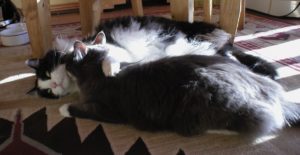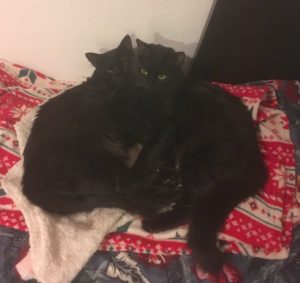Cats are said to be the most recently domesticated animal – some people don’t even consider them domesticated! Cats have been hanging out with people for about 10,000 years (dogs have been with us a bit longer – 15,000 years). How did they become “house” cats?
As people began to settle down and farm, they began to store grains. The house mouse was not far behind, moving in to share the feast.
Enter Felis Silvestris Catus…
The domestic cat’s closest relative is the North African wildcat – a solitary hunter. At the grain stores, there was plenty of prey in a small area. The mother wildcat did not have to drive off her daughters when they became adults as there was plenty of food for everyone. Some wildcats embarked on a social experiment that resulted in Felis Silverstris Catus, the furr ball who just may be lounging on your keyboard right now.
The Rise of the Cat Colony
The major difference between the North African wildcat and the domestic cat, Felis Catus, is behavior. If there is plenty of food around, Felis Catus tends to form groups called colonies. The core of the cat colony are the females, typically a mother, her sisters, and her daughters. These females share the care of the kittens – they nurse each others’ kittens and even help each other give birth.

Male kittens – not so welcome
They are driven off by their mothers at maturity to avoid inbreeding. They can become solitary hunters like their wildcat ancestors or become attached to an unrelated colony if accepted by the females
INTERESTING FACT: cats from the same litter can have different fathers since the female cat will mate with multiple partners when in heat.

Family
A kitten’s instruction in the language of Cat begins with his mother, aunts, and littermates. Once weaned, he continues his studies with other juveniles and adults in the colony.
Cats tend to show more friendly behavior toward family members than outsiders. Hugs and back slapping are easier to accept from your parents and siblings; it can be downright uncomfortable from someone you barely know. Cats raised together as kittens can form strong bonds – they are often seen grooming each or rubbing against each other.
Friends and roommates
Unrelated cats living together are like school roommates – sometimes they become friends but often roommates just put up with each other. Imagine someone you have never laid eyes on before, showing up at your door with suitcases, ready to move in. Bringing a new cat home is like a roommate moving in. Want to get another cat? Consider…
- Some cats are just more friendly than others (genetics);
- Some cats have had better social experiences with other cats.
- Cats whose mothers/aunts are friendly to other cats also tend to be more friendly with other cats.
- There will always be cats that just do not like other cats.

